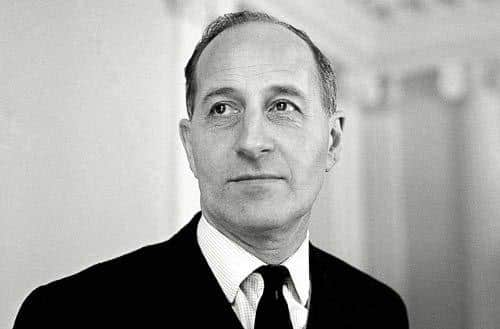Alex Kane: Unionism may well be heading towards a new schism


The following day the unionist members of the Executive resigned, after the NIO refused to open talks with the leaders of the Ulster Workers Council.
Around 3.30pm on May 29 Brian Faulkner left Parliament Buildings for the last time and noted the crowd of strike supporters who had gathered with their Ulster flags and Union Jacks around Carson’s statue. Thousands more were jamming the main driveways from the Upper Newtownards Road and Massey Avenue, waving their flags, singing and cheering.
Advertisement
Hide AdAdvertisement
Hide AdThis is what Faulkner wrote in ‘Memoirs of a Statesman’: ‘I understood why many determined Ulster folk had supported the general strike. The statue of Carson around which they gathered in front of Stormont symbolised their conviction that Ulster was going through another 1912. A plot was afoot, they believed, to deprive them of their British citizenship and push them by stages into an Irish republic which they regarded as an alien and hostile state.


‘So they rallied to the old slogans of No Surrender which had been given new relevance by the continuation of a vicious terrorist campaign directed largely against the civilian population. They had been cruelly misled and conned by all the would-be Carsons into believing that the reactions of 1912 were all that was required in 1974.’
Faulkner’s effigy was burned on bonfires a few weeks later: the latest traitor to have betrayed his unionist roots. Terence O’Neill had been accused of treachery in the 1960s. David Trimble was dismissed as a traitor in 1998. Ian Paisley joined the list a decade later when his ‘Chuckle Brothers’ double-act with Martin McGuinness seemed destined to wreck the DUP. Any unionist leader who now tries to make the case for reaching an arrangement which looks for the ‘best of both worlds’ or ‘opportunities’ in the NI Protocol will also be dismissed as a traitor.
But here’s something worth thinking about. O’Neill, Faulkner, Trimble and Paisley have all been reassessed since they left office. The fury that surrounded them at a key moment in their political careers has softened into the view they were probably making the best of the circumstances at the time. O’Neill having to respond to a huge civil rights movement that caught unionism completely off-guard and led to schisms that still exist. Faulkner desperate to find a replacement for the closed NI parliament, fully aware the UK government had also closed the door to one-party majority rule.
Advertisement
Hide AdAdvertisement
Hide AdTrimble accepting – and it was never an easy thing to accept – Sinn Fein (and an IRA which remained armed and organised) were part of the peace/political process because the UK government wanted them there and would continue to negotiate and facilitate even if unionism walked away. Paisley accepting the role with McGuinness because unionists believed he was preferable to Trimble as the leader of unionism; and because the UK government made it clear there would be no overall rewrite of the Good Friday Agreement.
In other words all four of them had to deal with the hand they were dealt: and deal with it knowing the UK government always held the key cards. The crowds who jeered O’Neill and Faulkner were never able to cheer a later, better solution. The UWC leadership was never able to negotiate an alternative to Sunningdale in the immediate aftermath of the strike. The hundreds of thousands who thronged Belfast city centre the week after the Anglo-Irish Agreement had to learn to live with it until 1998. Apart from a few cosmetic – and mostly self-serving changes – an electorally strong DUP found itself in much the same position as Trimble after 2007.
And now unionism faces another crisis: the protocol. Arlene Foster made conciliatory noises about it in January, tried to nuance her original comments and was toppled in the most brutal coup in the DUP’s history. Edwin Poots – with a paper-thin majority – has said he will do everything he can to destroy the protocol: but stopped just short of indicating a willingness to bring down the Assembly.
And now he faces the combined pressure of the Orange Order, TUV, Loyalist Communities Council and a younger element of loyalism, all of which want the ante upped in various ways and all of whom seem happy enough for the Assembly to be collapsed. To be honest, I don’t know if they think a subsequent early election would galvanise unionism and maximise the unionist/loyalist vote; or whether they think a rerun of the 2017-20 hiatus would provide some sort of breathing space to rethink and regroup.
Advertisement
Hide AdAdvertisement
Hide AdNew polling (and all a poll can do is give you a sense of feeling at a specific time) doesn’t look good for the DUP in particular; and also indicates game-changing voting patterns across the three main unionist parties. I know there’s a tendency nowadays to knock the validity or accuracy of polling, but I also know all the parties in NI take seriously the findings of the polls at the end of January and a few days ago.
I don’t know how unionist responses to the protocol will pan out over the next few months. More importantly, I’m not sure if anyone across unionism/loyalism does, either. I’m old enough to remember the challenges to unionism in 1968, 1972, 1974, 1985, 1993, 1995 and 1998. I also remember the responses: and the lack of agreed, thought-through alternatives to what unionism rejected at the time.
Crucially, I remember the schisms afterwards, too.
——— ———
A message from the Editor:
Thank you for reading this story on our website. While I have your attention, I also have an important request to make of you.
With the coronavirus lockdown having a major impact on many of our advertisers — and consequently the revenue we receive — we are more reliant than ever on you taking out a digital subscription.
Advertisement
Hide AdAdvertisement
Hide AdSubscribe to newsletter.co.uk and enjoy unlimited access to the best Northern Ireland and UK news and information online and on our app. With a digital subscription, you can read more than 5 articles, see fewer ads, enjoy faster load times, and get access to exclusive newsletters and content. Visit https://www.newsletter.co.uk/subscriptions now to sign up.
Our journalism costs money and we rely on advertising, print and digital revenues to help to support them. By supporting us, we are able to support you in providing trusted, fact-checked content for this website.
Alistair Bushe
Editor